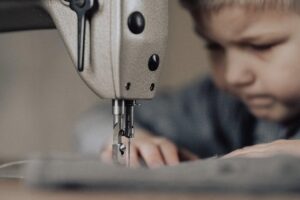There’s little doubt that excessive consumption is harming communities and the environment. For one, the manufacturing processes produce vast amounts of waste and emissions to transport products to customers. For another, many companies have elected to use cheaper materials to save on production costs, which eventually causes these same products to degrade earlier in their life cycle. As a result, consumers have to spend more money finding replacements rather than repairing a well-made item. It’s a difficult issue. But you may be surprised to learn that libraries can be part of the solution.
This is because libraries now and in the future are tending toward being more dynamic community spaces. They offer multiple resources, give people areas to congregate, and are sources of diverse expertise. As a result, they are central to activities related to building a genuinely sustainable circular economy.

Sharing Green Knowledge and Resources
Libraries across the world play a pivotal role as forts of knowledge. This is no different when it comes to maintaining community sustainability. Generally speaking, climate change continues to worsen because many people don’t have the skills or understanding to make meaningful green changes in their lives. Therefore, librarians can contribute to a sustainable future as guides to setting and achieving Sustainable Development Goals (SDGs) in their everyday activities and businesses.
First, individual librarians or groups can help the public to understand what key SDGs are. Within the context of a circular economy — a system that prioritizes reusing, repairing, and recycling products — librarians can coach on sustainable consumption and production patterns, including sustainable publishing. Libraries can host public discussions about what this means and practical approaches to achieving it. To become approachable, these discussions can direct locals to organizations in the community where they can purchase old items or who may accept old materials for recycling.
Growing a Sustainable Writing Community
Libraries can also serve as ecosystems for budding writers while promoting sustainability. While buying books as individuals is a great way to support authors financially, libraries can purchase books which allows multiple people to enjoy the book. This makes the author’s work more accessible, more sustainable and reduces over consumption.
In addition, libraries can be an ideal place to harbor writing conferences, writers-in-residence, and writing workshops to introduce local authors to the community.
Hosting Maker Spaces
Among the key tenets of a sustainable circular economy is to reduce the potential for both over consumption and to minimize unnecessary waste. Community members need to be able to make items from scratch and repair their current items. Libraries can contribute to these efforts by hosting maker spaces.
This is something that more libraries could practically implement. Many maker activities, such as 3D printing, don’t need specialist spaces, like workshops or ateliers. Indeed, the increasing accessibility of equipment can make libraries a good location for such projects. Local experts and librarians can also teach or host learning sessions about how to go about using 3D printing for the first time. They can also further encourage eco-friendly behavior by recommending more sustainable materials that we’ll see in the future. For example, materials such as polylactic acid (PLA) filaments are made from biodegradable products such as corn starch and can help anyone interested in building practical items.
Creating Libraries of Things
For some time now, libraries around the world haven’t simply been book repositories. They’re host to a wide range of resources, from movies and music to eBooks. Yet, there’s also a growing movement for libraries of things. Essentially, this is about lending practical and in-need objects. This potentially boosts the circular economy by minimizing unnecessary production demand while making items more accessible to those on lower incomes.
Nevertheless, a truly impactful library of things addresses the needs of the community. It may be practical to lend board games and tabletop roleplaying games so that families can minimize their screen time. Cookware and bakeware lending might engage library users in more creative culinary and nutrition activities. Exercise equipment can boost community wellness. Some libraries are increasing access to museums, planetariums and science education centers by offering passes to these organizations for the whole community to access.
Conclusion
Libraries are becoming circular economy hubs. They’re increasingly offering access to practical knowledge, repair workshops, and lendable tools, among other resources. There’s still more they can do, though. However, this is dependent on greater community engagement and finding sources of funding. The public needs to show that there’s a demand for these services in library spaces alongside seeking support from philanthropic organizations, private businesses, and government agencies.

Amanda Winstead is a writer from the Portland area with a background in communications and a passion for telling stories. Along with writing she enjoys traveling, reading, working out, and going to concerts. If you want to follow her writing journey, or even just say hi you can find her on Twitter.
